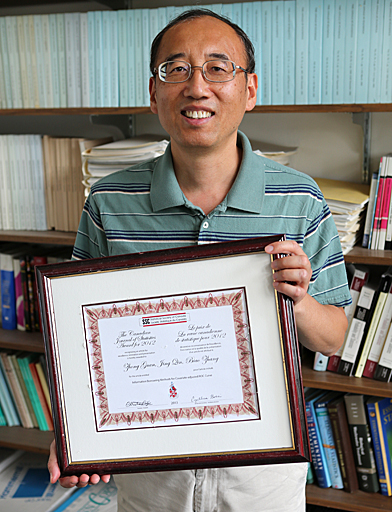A University of Toledo math professor has been honored by the Statistical Society of Canada for a study that researched the separation between control groups and case groups in medical studies.

Dr. Biao Zhang showed off the Canadian Journal of Statistics Award he received for his research from the Statistical Society of Canada.
“I am very honored. To win this award means that our research was recognized for being innovative in both methodology and presentation,” Zhang said. “I am grateful for the attention, but hopefully this also brings more attention to the importance of statistics in the area of medical diagnostics.”
The Canadian Journal of Statistics Award is given annually by the Statistical Society of Canada to the author(s) of an article published in the previous year in the publication in recognition of the outstanding quality of the paper’s methodological innovation and presentation, according to Christian Leger, president of the Statistical Society of Canada.
Zhang and his partners Dr. Zhong Guan, professor of mathematical sciences at Indiana University at South Bend, and Dr. Jing Qin, mathematical statistician with the National Institute of Allergy and Infectious Diseases, published a paper titled “Information Borrowing Methods for Covariate-Adjusted ROC (Receiver Operating Characteristic) Curve,” in the September 2012 issue of the Canadian Journal of Statistics.
“Essentially, our paper focuses on the issue of achieving separation between control and disease (case) groups in medical studies,” said Zhang, who joined the UT faculty in 1993. “Often, the information we have about specific patients in a study is limited due to factors such as cost, sample size and ethical issues. Thus, it is important to assess the accuracy of medical diagnostic tests.
“We present two models that build upon this approach by simultaneously considering the effect of multiple, related covariates — observed variables that are not manipulated but can affect the study’s outcome — and follow up with a simulation study to demonstrate that our models work.”
The Statistical Society of Canada is a professional organization with a mission to promote the development and use of statistics. It has been running for more than 70 years.